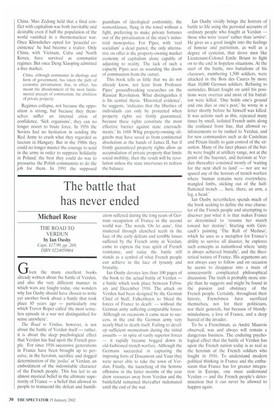The battle that has never ended
Michael Rose
THE ROAD TO VERDUN by Ian Ousby Cape, £17.99, pp. 269, ISBN 0224059904 Given the many excellent books already written about the battle of Verdun, and also the very different manner in which wars are fought today, one wonders why Ian Ousby should have chosen to write yet another book about a battle that took place 85 years ago — particularly one which Trevor Roper called 'the most senseless episode in a war not distinguished for sense anywhere'.
The Road to Verdun. however, is not about the battle of Verdun itself — rather, it is about the deep psychological effect that Verdun has had upon the French people. For since 1916 successive generations in France have been brought up to perceive, in the heroism, sacrifice and dogged determination of the 'podus' at Verdun, an embodiment of the indomitable character of the French people. This has led to an almost mystical belief in the ultimate superiority of France — a belief that allowed its people to transcend the defeat and humili
ation suffered during the long years of German occupation of France in the second world war. The words 'On les aura', first muttered through clenched teeth in the face of the early defeats and terrible losses suffered by the French army at Verdun, came to express the true spirit of French resistance, and today the battle still stands as a symbol of what French people can achieve in the face of tyranny and brutality.
Ian Ousby devotes less than 100 pages of the book to the actual battle of Verdun — a battle which took place between February and December 1916. The attack on Verdun had been designed by the German Chief of Staff, Falkenhayn, to 'bleed the forces of France to death' — without the German army suffering comparable losses. Although on occasions it came near to success, in the end the German army very nearly bled to death itself. Failing to develop sufficient momentum during the initial assaults — in spite of vastly superior forces it rapidly became bogged down in old-fashioned trench warfare. Although the Germans succeeded in capturing the imposing forts of Douamont and Vaux they were never able to take the town of Verdun. Finally, the launching of the Somme offensive in the latter months of the year drew resources away from Verdun and the battlefield remained thereafter stalemated until the end of the war.
Ian Ousby vividly brings the horrors of battle to life using the personal accounts of ordinary people who fought at Verdun — those who were 'avant' rather than `arriere'. He gives us a good insight into the feelings of honour and patriotism, as well as a degree of cynicism, that drove men like Lieutenant-Colonel Emile Briant to fight on to the end in hopeless situations. At the start of the battle, two battalions of his chasseurs, numbering 1,500 soldiers, were attacked in the Bois des Caures by more than 10,000 German soldiers. Refusing to surrender, Briant fought on until his positions were overrun and most of his battalion were killed. 'One holds one's ground and one dies at one's post,' he wrote in a letter shortly before he himself was killed. It was actions such as this, repeated many times by small, isolated French units along the confused front line, that allowed reinforcements to be rushed to Verdun, and for new commanders such as de Castelnau and Petain finally to gain control of the situation. Many of the later phases of the battle were fought at artillery range, not at the point of the bayonet, and heroism at Verdun thereafter consisted mostly of 'waiting for the next shell to land' — nor are we spared any of the horrors of trench warfare where 'human remains were everywhere, mangled limbs, sticking out of the halfflattened trench ... here, there, an arm, a leg, a head.'
Ian Ousby nevertheless spends much of the book seeking to define the true character of the French people and attempting to discover just what it is that makes France so determined to 'resume her march toward her destiny'. Starting with Gericault's painting 'The Raft of Medusa', which he uses as a metaphor for France's ability to survive all disaster, he explores such concepts as nationhood where 'unity is always achieved brutally', and the theoretical nature of France. His arguments are not always easy to follow and on occasion he seems to disappear into a maze of unnecessarily complicated philosophical discussion. The truth is probably more simple than he suggests and might be found in the passion and obstinacy of the French people. Certainly, throughout their history, Frenchmen have sacrificed themselves, not for their politicians, nor their generals, but because of bloodymindedness, a love of France, and a deep hatred of the invader.
To be a Frenchman, as Andre Maurois observed, was and always will remain a dangerous business. The enduring psychological effect that the battle of Verdun has upon the French nation today is as real as the heroism of the French soldiers who fought in 1916. To understand modern political thinking in France and the enthusiasm that France has for greater integration in Europe, one must understand Verdun — and the French people's determination that it can never be allowed to happen again.






























































 Previous page
Previous page